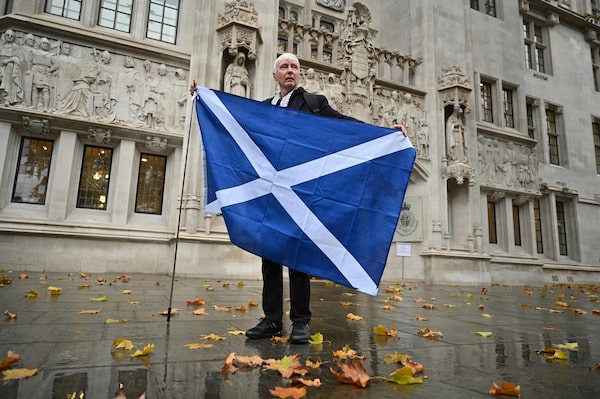
A Scottish independence supporter with the flag of Scotland outside the Supreme Court in London on Nov. 23.JUSTIN TALLIS/AFP/Getty Images
The U.K.’s highest court ruled unanimously Wednesday that the Scottish Parliament cannot hold a second independence referendum – without the consent of the British government – citing grounds that the Scots are no more oppressed than Quebeckers.
The court said Scotland could not pass its own law to hold the vote because such a bill would affect the future of the U.K., a matter that is reserved for Westminster.
The ruling referred extensively to an opinion by Canada’s Supreme Court in 1998 on whether Quebec could decide on its own to split from Canada.
It said the “observations” by Canada’s Supreme Court, including that Quebec did not meet the threshold of “an oppressed people,” apply “with equal force to the position of Scotland and the people of Scotland within the United Kingdom.”
Scotland’s First Minister, Nicola Sturgeon, wanted to hold a second referendum in October, 2023, on whether Scotland should become independent from Britain. In 2014, in a previous referendum, Scottish voters backed staying in the U.K. by 55 per cent to 45 per cent.
Ms. Sturgeon, leader of the Scottish National Party, rejected Wednesday’s ruling, saying: “Scottish democracy will not be denied.”
At a news conference, Ms. Sturgeon said she respected the court’s ruling, but said it confirms that “the notion of the U.K. as a voluntary partnership of nations, if it ever was a reality, is no longer a reality.”
“We must and we will find another democratic, lawful and constitutional means by which the Scottish people can express their will. In my view, that can only be an election,” she said.
The judges cited at length Canada’s 1998 Supreme Court opinion on whether Quebec could decide on its own to split from Canada. They recorded their view that “the then-constitutional arrangements within Canada did not place Quebeckers in a disadvantaged position.”
The U.K. Supreme Court considered when the right to self-determination applies under international law, citing the Canadian Supreme Court’s views that this could apply “where a people is oppressed, as for example under foreign military occupation; or where a definable group is denied meaningful access to government to pursue their political, economic, social and cultural development.”
The opinion – quoted by Britain’s top court – said that not only did Quebec not meet the threshold for an oppressed people but it cannot “be suggested that Quebeckers have been denied meaningful access to government to pursue their political, economic, cultural and social development.”
The Canadian court decision took place after a 1995 Quebec referendum, which saw a turnout of more than 93 per cent, the largest in Quebec’s history. Quebeckers voted narrowly – by only 50.58 per cent of the votes cast – not to proclaim their sovereignty and become an independent country.
Professor Robert Leckey, dean of McGill University’s law school, and an expert in constitutional law, said it was interesting that the U.K.’s Supreme Court had looked to Canada’s Supreme Court when reaching its conclusion. He said foreign courts do sometimes consider the opinions of counterparts on similar legal questions when it comes to international law.
He said the Canadian Supreme Court opinion of 1998 was carefully considered and drafted and had balanced complex legal and political questions.
“It’s a positive sign that the apex court of one liberal democracy is open to learning from the wisdom of its counterpart in another liberal democracy,” he said.
The Canadian Supreme Court decided that for Quebec to decide on its own to split from Canada would violate Canadian constitutional law, as well as international law. But it ruled that a constitutional amendment would make this possible.
If Quebec were to hold a referendum on independence and won a clear majority, the rest of Canada would be obliged to negotiate terms of independence, it said.
Yves-François Blanchet, head of the Bloc Québécois, said on Twitter in response to the Scottish decision: “The right of self-determination is not conditional. Scotland should proceed according to the will of its people and consult them.”
,